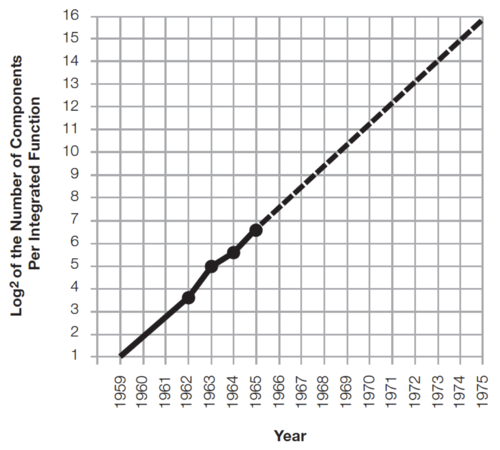Difference between revisions of "CoE 197U Scaling"
Jump to navigation
Jump to search

| Line 1: | Line 1: | ||
== Moore's Law == | == Moore's Law == | ||
| + | [[File:Moore paper figure.png|thumb|500px|Figure 1: Gordon Moore's prediction<ref name="moore1965"/>.]] | ||
In 1965, Gordon Moore published a 4-page paper entitled "Cramming more components onto integrated circuits"<ref name="moore1965">Gordon E Moore, Cramming more components onto integrated circuits, Electronics, Volume 38, Number 8, April 19, 1965 ([https://newsroom.intel.com/wp-content/uploads/sites/11/2018/05/moores-law-electronics.pdf pdf])</ref>, where he predicted that the number of components in an integrated circuit will increase by a factor of two every year. | In 1965, Gordon Moore published a 4-page paper entitled "Cramming more components onto integrated circuits"<ref name="moore1965">Gordon E Moore, Cramming more components onto integrated circuits, Electronics, Volume 38, Number 8, April 19, 1965 ([https://newsroom.intel.com/wp-content/uploads/sites/11/2018/05/moores-law-electronics.pdf pdf])</ref>, where he predicted that the number of components in an integrated circuit will increase by a factor of two every year. | ||
Revision as of 18:07, 22 February 2021
Contents
Moore's Law

Figure 1: Gordon Moore's prediction[1].
In 1965, Gordon Moore published a 4-page paper entitled "Cramming more components onto integrated circuits"[1], where he predicted that the number of components in an integrated circuit will increase by a factor of two every year.